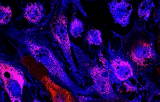
1p36/1q25 probe for FISH CE/IVD - Brain and neural pathology
Deletions affecting the short arm of chromosome 1 (1p) are frequently found in human gliomas and neuroblastomas, but also in breast, lung, endometrial, ovarian, and colorectal carcinomas. Deletions affecting the long arm of chromosome 19 (19q) are frequently found in human malignant gliomas as well as in neuroblastomas and epithelial ovarian cancers. Combined loss of the complete 1p/19q chromsome arms, caused by an unbalanced t(1;19)(q10;p10) translocation, is characteristic of oligodendrogliomas. According to the 2016 WHO criteria for classification of tumors of the central nervous system, the detection of 1p/19q loss is required for the diagnosis of WHO grade II or III “oligodendroglioma, IDH-mutant and 1p/19q codeleted”. Since both, astrocytomas and oligodendrogliomas, can exhibit IDH mutations, evaluation of 1p/19q status plays a critical role in differentiating astrocytoma from oligodendroglioma. Oligodendroglioma morphology, IDH-mutant genotype, and 1p/19q codeletion are associated with better response to chemotherapy and improved survival. Hence, determination of 1p and 19q status may aid in therapeutic decisions and predict outcome in patients with diffuse gliomas.
Search result : 0 product found
Refine your search :
RUOCE / IVD
Cat#
Description
Cond.
Price Bef. VAT
‹
›

